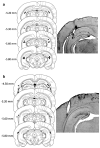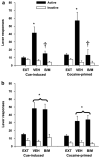Selective inactivation of the ventral hippocampus attenuates cue-induced and cocaine-primed reinstatement of drug-seeking in rats
- PMID: 17337218
- PMCID: PMC1896086
- DOI: 10.1016/j.nlm.2007.01.003
Selective inactivation of the ventral hippocampus attenuates cue-induced and cocaine-primed reinstatement of drug-seeking in rats
Erratum in
- Neurobiol Learn Mem. 2008 Jan;89(1):86
Abstract
Recent evidence suggests that the hippocampus may have a functional role in mediating relapse to cocaine-seeking behavior. Based on the importance of the ventral CA subfields in mediating reward, the present experiment determined the effects of temporary inactivation of the ventral hippocampus on reinstatement of cocaine-seeking in a rodent model of relapse. Male, Sprague-Dawley rats self-administered i.v. cocaine (0.6 mg/kg/infusion) in the presence of discrete conditioned cues (tone+light) in daily 2-h sessions for ten days. Following seven days of extinction sessions in which neither cues nor drug were available, rats underwent four reinstatement tests in a counterbalanced, within-subjects design. Bilateral microinjections of GABA receptor agonists (baclofen/muscimol (B/M; 1.0 mM/0.1 mM) [corrected] into the ventral hippocampus significantly attenuated cue-induced and cocaine-primed reinstatement compared with vehicle microinjections in the same rats. In contrast, injections just outside the ventral hippocampus did not block either form of reinstatement. Furthermore, inactivation failed to affect responding for food reinforcement, baseline extinction responding, or locomotor activity. These data indicate that the ventral hippocampus plays an important role in the relapse to cocaine-seeking behavior and may interact with key limbic structures previously implicated in cocaine addiction.
Figures


Similar articles
-
The Dorsal Agranular Insular Cortex Regulates the Cued Reinstatement of Cocaine-Seeking, but not Food-Seeking, Behavior in Rats.Neuropsychopharmacology. 2015 Sep;40(10):2425-33. doi: 10.1038/npp.2015.92. Epub 2015 Apr 3. Neuropsychopharmacology. 2015. PMID: 25837282 Free PMC article.
-
Sub-region specific contribution of the ventral hippocampus to drug context-induced reinstatement of cocaine-seeking behavior in rats.Neuroscience. 2010 Dec 15;171(3):830-9. doi: 10.1016/j.neuroscience.2010.09.032. Epub 2010 Sep 24. Neuroscience. 2010. PMID: 20870011 Free PMC article.
-
NMDA receptor blockade in the basolateral amygdala disrupts consolidation of stimulus-reward memory and extinction learning during reinstatement of cocaine-seeking in an animal model of relapse.Neurobiol Learn Mem. 2007 Nov;88(4):435-44. doi: 10.1016/j.nlm.2007.05.006. Epub 2007 Jul 5. Neurobiol Learn Mem. 2007. PMID: 17613253 Free PMC article.
-
Dopamine D1 or D2 receptor antagonism within the basolateral amygdala differentially alters the acquisition of cocaine-cue associations necessary for cue-induced reinstatement of cocaine-seeking.Neuroscience. 2006;137(2):699-706. doi: 10.1016/j.neuroscience.2005.08.064. Epub 2005 Nov 14. Neuroscience. 2006. PMID: 16289883
-
Reversible inactivation of the basolateral amygdala, but not the dorsolateral caudate putamen, attenuates consolidation of cocaine-cue associative learning in a reinstatement model of drug-seeking.Eur J Neurosci. 2010 Sep;32(6):1024-9. doi: 10.1111/j.1460-9568.2010.07394.x. Epub 2010 Aug 26. Eur J Neurosci. 2010. PMID: 20796021 Free PMC article.
Cited by
-
Cocaine-induced adaptations in metabotropic inhibitory signaling in the mesocorticolimbic system.Rev Neurosci. 2012;23(4):325-51. doi: 10.1515/revneuro-2012-0045. Rev Neurosci. 2012. PMID: 22944653 Free PMC article. Review.
-
Role of the bed nucleus of the stria terminalis in the control of ventral tegmental area dopamine neurons.Prog Neuropsychopharmacol Biol Psychiatry. 2009 Nov 13;33(8):1336-46. doi: 10.1016/j.pnpbp.2009.07.010. Epub 2009 Jul 16. Prog Neuropsychopharmacol Biol Psychiatry. 2009. PMID: 19616054 Free PMC article.
-
Circuit selectivity in drug versus natural reward seeking behaviors.J Neurochem. 2021 Jun;157(5):1450-1472. doi: 10.1111/jnc.15297. Epub 2021 Feb 13. J Neurochem. 2021. PMID: 33420731 Free PMC article. Review.
-
Hippocampal regulation of contextual cue-induced reinstatement of cocaine-seeking behavior.Pharmacol Biochem Behav. 2008 Sep;90(3):481-91. doi: 10.1016/j.pbb.2008.04.007. Epub 2008 Apr 15. Pharmacol Biochem Behav. 2008. PMID: 18499239 Free PMC article.
-
Deep brain stimulation of the infralimbic cortex attenuates cocaine priming-induced reinstatement of drug seeking.Brain Res. 2020 Nov 1;1746:147011. doi: 10.1016/j.brainres.2020.147011. Epub 2020 Jul 8. Brain Res. 2020. PMID: 32652146 Free PMC article.
References
-
- Bannerman DM, Rawlins JNP, McHugh SB, Deacon RMJ, Yee BK, Bast T. Regional dissociation within the hippocampus-memory and anxiety. Neuroscience and Biobehavioral Reviews. 2004;28:273–283. - PubMed
-
- Bast T, Zhang W, Feldon J. The ventral hippocampus and fear conditioning in rats. Experimental Brain Research. 2001;139:39–52. - PubMed
-
- Berke JD, Eichenbaum HB. Drug addiction and the hippocampus. Science. 2001;294:1235. - PubMed
-
- Black YD, Green-Jordan K, Eichenbaum HB, Kantak KM. Hippocampal memory system function and the regulation of cocaine self-administration behavior in rats. Behavioral Brain Research. 2004;151:225–238. - PubMed
-
- Fuchs RA, Evans KA, Ledford CC, Parker MP, Case JM, Mehta RM, et al. The role of the dorsomedial prefrontal cortex, basolateral amygdala, and dorsal hippocampus in contextual reinstatement of cocaine seeking in rats. Neuropsychopharmacology. 2005;30:296–309. - PubMed
Publication types
MeSH terms
Substances
Grants and funding
LinkOut - more resources
Full Text Sources

